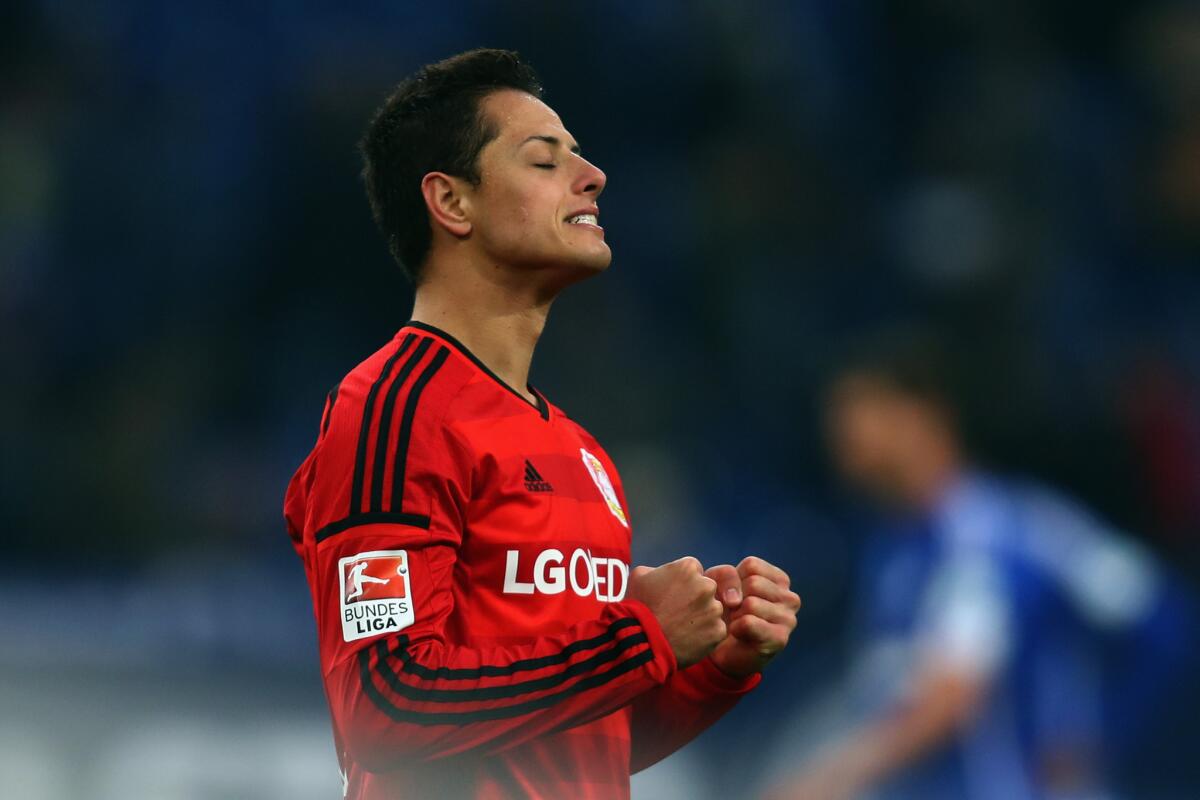Javier ‘Chicharito’ Hernandez is chasing a lot of goals with Mexico’s national soccer team
- Share via
Jared Borgetti is the most prolific scorer in the history of the Mexican national team, a significant accomplishment in a country where soccer is more a religion than a sport.
But his record is now endangered. When the national team gathers in two weeks, Javier “Chicharito” Hernandez will enter the training camp with 43 international goals, three shy of Borgetti’s mark. And with Mexico scheduled to play as many as 10 games over the next four months, the question is no longer will Hernandez break the record, but when.
“It could happen at any moment,” Borgetti, now a commentator on ESPN Deportes, said with a shrug. “Records … are not forever. It someone can do it, go ahead.”
Hernandez has another goal in mind, though. The 27-year-old striker would like to win a major international tournament with Mexico, something he’ll get three shots at over the next two years: in the Copa America Centenario this summer, at the Confederations Cup next summer and in the 2018 World Cup in Russia.
“People are going to say that that’s so far away,” he said of winning a major championship. “But for me, I’m going to dream it. I want it.”
Hernandez could get both the record and the dream next month when the 100th-anniversary edition of Copa America, soccer’s oldest international competition and one of the sport’s most prestigious, is held in the U.S. for the first time. Mexico will begin play in the tournament June 5, when it faces Uruguay in Glendale, Ariz. Mexico will also play at the Rose Bowl, meeting Jamaica there June 9.
A couple of weeks ago it was uncertain where Hernandez would play this summer because Mexico also qualified for August’s Olympic Games in Brazil. Four years ago, Hernandez couldn’t hide his disappointment when Manchester United, then his club team, refused to release him for the 2012 Olympic tournament.
Mexico won its first soccer gold medal without him.
This spring he asked his new club, Germany’s Bayer Leverkusen, for permission to play in both the Copa America and the Olympics. But after weeks of negotiations, Hernandez accepted a Copa America compromise.
“It’s the best thing for the three — the [Mexican] federation, Bayer Leverkusen and me,” he said.
But the compromise can also be interpreted as a thank you for Leverkusen, which Hernandez credits for reviving his career.
After scoring 50 goals in his first three seasons at Manchester United, Hernandez fell out of favor when Alex Ferguson stepped down as coach. By last season he had become expendable and was loaned to Real Madrid, where he started just 12 games.
A transfer to Leverkusen last summer proved a better fit, with Hernandez setting career highs for starts (37) and goals (26) in the Bundesliga, while helping the team clinch an automatic berth in the Champions League for the first time in four seasons.
He’s almost too good for Bayer.
— Thomas Hitzlsperger, Fox Sports commentator

Bayern Leverkusen forward Javier Hernandez celebrates after the Bundesliga match against FC Schalke 04 on Apr. 23.
“He’s almost too good for Bayer,” said Thomas Hitzlsperger, a former German national team star and now a commentator on Bundesliga games for Fox Sports. “He’s making clever runs, good finisher. He has that determination a striker needs. He wants to score even when they are five [goals] up.”
Hernandez says there was no secret to the turnaround. All he needed was a chance to play.
“They wanted me to come here to do what the other clubs didn’t let me do,” he said by phone from Leverkusen, where he’ll finish his first Bundesliga season Saturday. “They trusted me. They put me on the pitch.”
Because of that confidence, Hernandez has left the door open for a return to Leverkusen next season. He has also spoken highly of Major League Soccer, suggesting a move to the U.S. could happen after the 2018 World Cup.
He’s already hugely popular in the U.S., with his Mexican national team jersey annually ranking among the best-sellers in Southern California.
“I didn’t know that. That’s very motivating. To spend money, buy things with my name, with my number, to follow my career? I only have very good words for [the fans],” he said. “But … this is a group sport. I’m Chicharito because of the teammates I’ve played with. I cannot do this by myself.”
Actually he’s Chicharito because of his father Javier Sr., a former Mexican national team midfielder whose green eyes earned him the nickname “Chicharo,” Spanish for “pea.” So his son became “Chicharito,” the little pea.
Now Chicharito would like to earn comparisons to his father on the field, too. Because for all the younger Hernandez’s goal-scoring success, it was the father who played on Mexico’s most successful World Cup team, one that reached the quarterfinals in 1986.
A deep run in next month’s Copa America could build the foundation for an even better performance two years from now in Russia. And Hernandez insists he’d rather have that than a scoring record.
“If I break it, fine,” he said of Borgetti’s 11-year-old mark. “If I don’t, it’s going to be fine for me because it’s not what I dreamed about. What I dreamed about was to play in the World Cup with my country and to try to win one.
“But that record is there. And if I beat it or not, only God and time will tell.”





